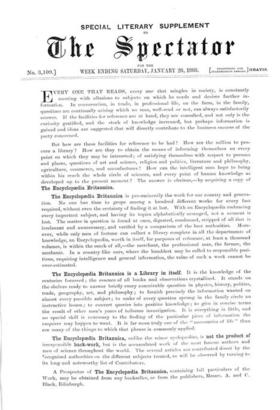J VERY ONE THAT READS, every one that mingles in society,
is constantly -F meeting with allusions to subjects on which lie needs and desires further in- formation. In conversation, in trade, in professional life, on the farm, in the family, questions are continually arising which no man, well-read or not, can always satisfactorily answer. lf the facilities for reference are at hand, they are consulted, and not only is the curiosity gratified, and the stock of knowledge increased, but perhaps information is gained and ideas are suggested that will directly contribute to the business success of the party concerned.
But how are these facilities for reference to be had? How are the million to pro- cure a library ? How are they to obtain the means of informing themselves on every point on which they may be interested; of satisfying themselves with respect to persons and places, questions of art and science, religion and politics, literature and philosophy, agriculture, commerce, and manufactures ? How can the intelligent man hope to bring within his reach the whole circle of sciences, and every point of human knowledge as developed up to the present moment ? The answer is obvious,—by acquiring a copy of The Encyclopedia Britannica.
The Encyclopedia Britannica is pre-eminently the work for our country and genera- tion. No one has time to grope among a hundred different works for every fact required, without even the certainty of finding it at last. With an Encyclopedia embracing every important subject, and having its topics alphabetically arranged, not a moment is lost. The matter in question is found at once, digested, condensed, stripped of all that is irrelevant and unnecessary, and verified by a comparison of the best authorities. More- over, while only men of fortune can collect a library complete in all the departments of knowledge, an Encyclopedia, worth in itself, for purposes of reference, at least a thousand volumes, is within the reach of all,—the merchant, the professional man, the farmer, the mechanic. In a country like ours, where the humblest may be called to responsible posi- tions, requiring intelligence and general information, the value of such a work cannot be over-estimated.
The Encyclopmdia Britannica is a Library in itself. It is the knowledge of the centuries focussed ; the essence of all books and observations crystallised. It stands on the shelves ready to answer briefly every conceivable question in physics, history, politics, trade, geography, art, and philosophy; to furnish precisely the information wanted on almost every possible subject; to make of every question sprung in the family circle an instructive lesson; to convert queries into positive knowledge; to give in concise terms the result of other men's years of toilsome investigation. It is everything in little, and no special skill is necessary to the finding of the particular piece of information the enquirer may happen to want. It is far more truly one of the "necessaries of life" than are many of the things to which that phrase is commonly applied.
The Encyclopmdia Britannica, unlike the minor cvclopedias, is not the product of irresponsible hack-work, but is the accumulated work of the most famous authors and men of science throughout the world. The several articles are contributed direct by the recognised authorities on the different subjects treated, as will be observed by turning to its long and noteworthy list of Contributors.
A Prospectus of The EncyclopEedia Britannica, containing full particulars of the Work, may be obtained from any bookseller, or from the publishers, Messrs. A. and C. Black, Edinburgh.


















































 Previous page
Previous page